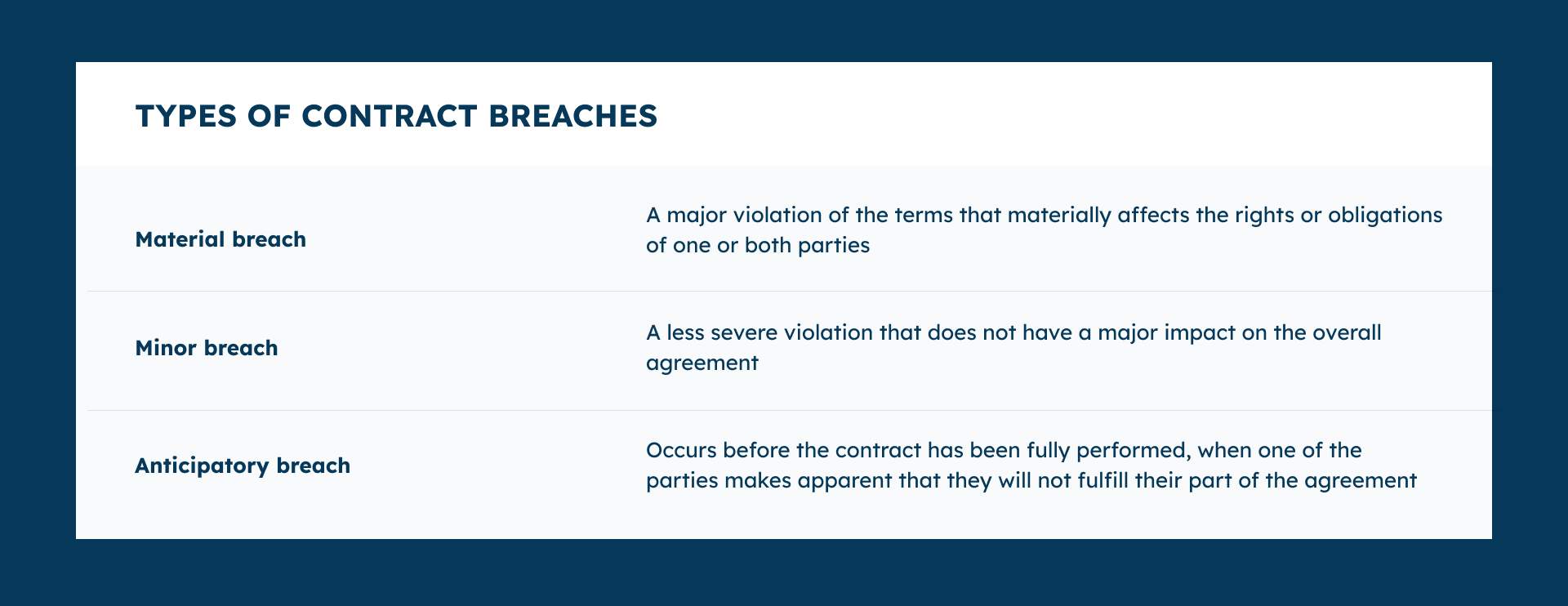When it comes to drafting a legally binding contract, ensuring that the breach of contract clause is written correctly is essential. A breach of contract can occur when one or both parties do not fulfill their duties set out in the agreement, and it is important to have a clause in place outlining procedures for such an occurrence.
Using the right steps and the right wording, lawyers can write and enforce a legally binding penalty clause that protects their clients' interests in case of a breach. Additionally, AI tools can make this job easier for lawyers and non-lawyers alike.
What is a breach of contract?
A breach of contract occurs when one or both parties do not fulfill their responsibilities as stated in the agreement. This can include failure to pay for services rendered, delivering goods late, or otherwise not following through with the agreed terms. The promise to fulfill certain responsibilities can be expressed (clearly written in the contract terms), or implied.
Types of contract breaches
Under common law, but also under some systems of civil law, there are three main types of contractual breaches. These include: material breach, minor breach, and anticipatory breach.
Material breach
A material breach is a major violation of the terms that materially affects the rights or obligations of one or both parties. This occurs when a party fails to meet the essential obligations outlined in the contract, for example by not paying for a product they agreed to purchase.
A material breach excuses the other party from having to perform their obligations under the contract, and they are entitled to damages for the breach.
Minor breach
Also known as a partial breach, it involves a less severe violation that does not have a major impact on the overall agreement. Minor breaches are more common, and typically involve a party not meeting a deadline or failing to fulfill their obligation in the specified manner (e.g. paying by check instead of with cash).
A minor breach does not excuse either party from performing their obligations. However, the non-breaching partner can still sue for damages or losses suffered as a result of the breach.
Anticipatory breach
An anticipatory breach occurs before the contract has been fully performed. It is when one of the parties declares or makes apparent that they will not fulfill their part of the agreement, for example by stating that they will not make a payment or deliver goods on time. This type of breach allows the non-breaching party to seek damages immediately, but it may be difficult to prove in court that the breach actually occurred.

What is a breach of contract clause?
A breach of contract clause outlines the procedures for dealing with potential breaches in the agreement. It states what actions will be taken if either party fails to follow through on their responsibilities as outlined in the contract, such as when one party does not pay for services rendered or delivers goods late. It should include details on how to handle disputes, how the breach will be remedied, and what damages may be awarded.
Risks of poorly written breach of contract clauses
Poorly written or incomplete breach of contract clauses can create a variety of risks for both parties involved in the agreement.
- Unclear procedures for resolving disputes. This could lead to lengthy court battles where either party is not sure of the outcome.
- Inadequate protection for one or both parties in the event of a breach, making them more vulnerable to legal action and potential financial losses.
- Confusion as to what constitutes a breach, leading to disputes and disagreements between parties.
How to write a breach of contract clause
A breach of contract clause has a simple purpose: to protect both parties should the agreement be broken, giving them instructions on how to proceed. The parties can decide to make the clause highly specific or fairly general. A general breach of contract clause may simply direct the parties to bring a court action for damages if they wish to do so. A more specific and detailed clause often defines a breach in detail and outlines the penalties for such an occurrence. It can also allow or force the parties to seek an informal resolution to their conflict (e.g. through mediations) before taking it to court.
6 tips for writing a thorough breach of contract clause
- Clearly define what constitutes a breach and appropriate remedy measures.
- Outline dispute resolution procedures for resolving any disputes that may arise from a potential breach.
- Establish who is liable for any losses caused by the breach, and how these losses will be calculated.
- Draft a penalty clause that outlines the punishments for any breach of contract. This should include the amount of damages, penalties, and attorney's fees that may be awarded.
- Include a clause on how to prepare and use a breach of contract notice, which provides evidence of the breach and serves as an official warning to the breaching party.
- Set realistic remedies for enforcing the clause. Specify what actions will be taken in case of a breach (such as a payment plan, suspension of services, or termination of the contract).
.png?width=1920&height=1001&name=Checklist%20Header%20(2).png)
Appropriate penalties for a contract breach
It is important to consider the nature of the breach and establish realistic penalties that are appropriate for the violation. Damages typically include compensation for any financial losses suffered as a result of the breach. Common penalties can include liquidated damages (a pre-set amount agreed upon by both parties), punitive damages, or attorney's fees. It is also important to consider the costs of enforcing the penalty clause, such as court fees and other legal expenses.
Drafting a breach of contract notice
A breach of contract notice is an official warning sent to the breaching party, informing them of the violation and giving them a timeline for correcting it. It should include details about the breach as well as a list of remedies that can be taken if the breach is not resolved.
Using a breach of contract clause template
Writing a breach of contract clause can be a complex process, and there are many factors to consider. Using a template can help streamline the process and ensure that the clause is comprehensive and accurate. However, it is important to carefully review the template and make any necessary changes or additions to ensure that it meets the requirements of the agreement and that it reflects local regulations.
Breach of contract clause FAQ
Q: What constitutes a contract breach?
A: A breach of contract is a violation of an agreement, either by one of the parties not performing their obligations or by one party failing to fulfill the terms of the agreement.
Q: How do you write a breach of contract clause?
A: First, clearly define what constitutes a breach and appropriate remedies. Outline dispute resolution procedures and establish who is liable for losses. Draft a penalty clause that outlines remedies for any breach and include a clause on how to prepare and use a breach of contract notice.
Q: What are some risks associated with poorly written breach of contract clauses?
A: Poorly written or incomplete breach of contract clauses can create a variety of risks for both parties involved in the agreement. These can include unclear procedures for resolving disputes, inadequate protection for one or both parties, and confusion as to what constitutes a breach. Failure to regulate certain issues may also result in the application of unfamiliar or general regulations.
Q: How can AI tools help when writing and enforcing breach of contract clauses?
A: AI tools such as natural language processing (NLP) can help automate the process of drafting contracts and ensure that all clauses are accurate and up-to-date. AI can also help to identify potential issues with breach of contract clauses quickly and accurately, alerting the parties to any potential problems before they arise. Additionally, AI can be used to automate enforcement of the clause by identifying violations and sending out reminders or other notifications as needed.
Q: Who is the defaulting party?
A: The defaulting party is the one who breaches the contract. They are liable for any losses caused by their breach and may be subject to penalties or other remedies outlined in the clause or by law.
Q: What is a penalty clause?
A: A penalty clause is a part of the breach of contract clause that outlines the punishments for any breach. This typically includes compensation for any losses, liquidated damages, punitive damages, and attorney's fees. However, it is worth knowing that there are legal systems where the introduction of the contractual penalty itself results in a limitation of liability to its amount.
Q: What are liquidated damages clauses?
A: Liquidated damages clauses are a type of penalty clause that specify a pre-set amount of money that the defaulting party must pay if they breach the contract. This amount is determined when the parties sign the agreement and can be used in lieu of other remedies or punishments.
Q: What is a primary obligation?
A: A primary obligation is a key term in a contract that must be fulfilled by one or both of the parties. This could include an agreement to provide goods, services, or payments on time and in accordance with the terms of the agreement. If this obligation is breached, it can be considered a breach of contract.
Q: What is a secondary obligation?
A: A secondary obligation is an obligation that arises from a breach of contract. Secondary obligations could include the obligation to pay damages or other remedies, depending on the terms of the breach of contract clause.
Q: What are the obligations of the breaching party?
A: The obligations of the breaching party depend on the severity of the breach and may include paying damages, providing remedies, or taking other corrective action. If a penalty clause has been included in the agreement, it may also specify additional punishments for any breach of contract.
Q: What are the obligations of the injured party?
A: Depending on the terms of the agreement, the injured party may be entitled to receive damages or other remedies. They may also be able to pursue legal action if necessary. However, depending on the exact terms of the contract, the innocent party may need to take specific steps in order to receive any compensation. For example, the deadlines for claims are important. When these expire, the claim may either expire or become time-barred.
Q: How is a breach of contract clause enforced?
A: Breach of contract clauses can be enforced through legal action, arbitration, or mediation.
Q: What are some examples of a breach of contract?
A: Examples of breach of contract can include failing to deliver goods or services as promised, not paying an agreed-upon amount, or failing to meet a deadline. Other examples include misrepresenting facts and violating confidentiality agreements.
Q: What are express terms?
A: Express terms are those that are specifically written into the contract. They usually include a description of obligations, performance deadlines, and remedies for breach of contract.
Q: What are implied terms?
A: Implied terms refer to obligations or conditions that are assumed to be included in the agreement even though they may not be explicitly stated. These can include things such as good faith and fair dealing, and reasonable care and skill.
Q: What constitutes actual loss and actual damages?
A: Actual loss is a measure of damages or other remedies that can be awarded if there has been a breach of contract. It refers to any losses directly caused by the breach, such as lost profits, legal fees, or other costs associated with the breach. Actual damages may not necessarily be the same as the penalty outlined in a breach of contract clause. They are typically determined on a case-by-case basis.
Q: When can a breach of contract clause be unenforceable?
A: A breach of contract clause may be unenforceable if it is unclear or incomplete, or if there are any issues with the language used. Additionally, a clause may not be enforceable if it violates legal principles such as unconscionability, public policy, or anti-competition laws.
How AI tools can help
Consider using AI tools to help write and enforce breach of contract clauses. AI can assist with drafting accurate language for contracts and flag any potential issues with clauses. It can also monitor compliance with agreements and alert relevant parties in case of a breach. This can help reduce the risk of disputes and ensure that contracts are enforced properly.
Writing effective breach of contract and penalty clauses
Breach of contract clauses are an important part of any agreement, as they outline what happens if either party fails to comply with the terms agreed upon. In order to protect both parties involved in a contract, it is essential to write clear and thorough breach of contract clauses and use AI tools to help ensure that they are properly enforced. Doing so will help minimize the risk of disputes and provide a more secure agreement for both parties.




